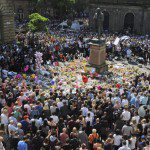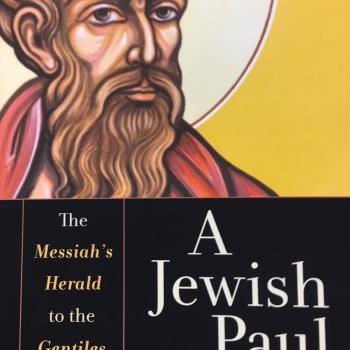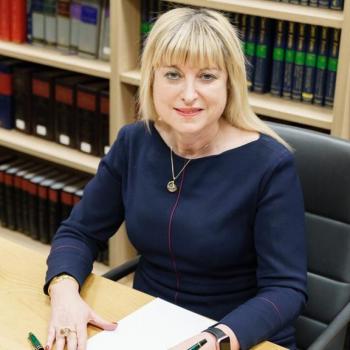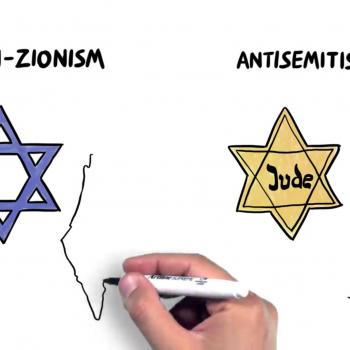Once again, the Board of Deputies of British Jews has shown itself to be a bully when it comes to interfaith dialogue on Israel/Palestine. This time its victim is the Church of Scotland. It’s all depressingly predictable and immensely tiresome for anyone who cares about justice in the Holy Land and indeed the future of Jewish-Christian relations in the U.K.
Balfour centenary
Later this month (20-26 May) the Church of Scotland’s General Assembly will consider a new report advising the Church on how to mark this year’s Balfour Declaration centenary. Balfour was a member of the Church of Scotland and the Church has a long association with the Holy Land through schools, projects supporting Christian Palestinians and partnerships with organisations promoting justice and reconciliation. So it has plenty of reasons for taking an active interest in the anniversary.
Among the report’s recommendations are:
- A call for any public commemorations of the Balfour Declaration to be undertaken sensitively, and always in the context for calling for peace and justice
- A call to the UK government to base its engagement in this conflict on the principles of justice, equality, dignity, equal access to natural resources and freedom of opportunity for all
- That the Church of Scotland should commend all those who are committed to the use of non-violent means of resolving the conflict
- That the Church of Scotland should deplore the increased expansion of settlements which are illegal under international law and an obstacle to peace
- That a strategic review of the Church of Scotland’s presence in the Holy Land be undertaken and to examine the most effective use of its assets, in the pursuit of a just peace in Israel/ Palestine, and report back to the General Assembly of 2019
- Encouragement to visit the Holy Land to better understand the realities faced by the Church’s partners working for justice and peace
- An instruction to all church members to challenge antisemitism and anti-Muslim prejudice.
- And encouragement to all church members to work ecumenically and with interfaith partners to pursue a shared vision for peace and justice in Israel/Palestine
But it’s clear that the Board and its President Jonathan Arkush have no interest in the Church of Scotland’s vision for peace. Immediately after the report was published, Arkush, condemned it as “deeply flawed” and told the Church of Scotland that it was displaying a “lack of balance and unconcealed hostility towards Israel.”
Once again we see how the Board acts as self-appointed public arbiter of acceptable discourse on Israel, especially when it comes to Christian denominations. But what exactly are the “flaws” in the report and why is it so “unbalanced”?
Sensitively written
If you read the 21 page document what you’ll discover is a very carefully and sensitively written assessment of the historical background to the Balfour Declaration and the current discrimination faced by Palestinians 100 years later despite the Declaration’s intention to protect the civil and religious rights of all of the land’s inhabitants. The framers of ‘Balfour’ deliberately left out ‘political’ and ‘national’ rights for the indigenous Arab inhabitants – that was only for the Jews. But none of that is of relevance to the Board.
Instead, President Arkush objects that:
“The report encourages the Church to question the very existence of the world’s only Jewish State. With good reason, the global consensus is in favour of a two state solution, yet the report states that the Church should ‘reconsider its support’”
In fact the report does nothing of the kind. It makes it very clear that the Church has no intention of denying the right of the State of Israel to exist and it also remains committed to ‘two States’. What it does question are the ‘facts on the ground’ created by Israeli Settlements that now make it hard to imagine how an independent, sovereign and contiguous Palestinian state can ever be established. In its haste to trash the report and smear the Church with sailing close to the UK government’s unhelpful definition of antisemitism, it doesn’t bother to give a truthful summary of its position.
Arkush goes on to say that:
“…thousands of Palestinian terror attacks and their Israeli victims are reduced to just two lines. The document is woefully inadequate in failing to grasp basic realities and historical truth.”
I wonder how many lines or pages about Palestinian terrorism would have been sufficient for the Board before it considered the report “balanced”? Do publications by the Board of Deputies contain sufficient mention of the daily assault on Palestinian human rights in order to provide “balance”? No, they don’t, not even one line.
A lesson in ‘balance’
As for the Balfour Declaration itself, the Board is a proud supporter of the official UK Jewish information resource on Balfour for the centenary year Balfour100.com If you want to know what a lack of historical balance looks like then this is the place to go. Of the 20 ‘Reactions’ to Balfour quoted on the website you will not find a single Arab voice or dissenting view on the merits of the Declaration. It’s the Church of Scotland that should be giving the Board a lecture on historical balance.
Finally, Arkush throws in what he intends to be the ultimate blow to the moral standing of the Church and its report:
“It shamefully allies the church to the divisive BDS [Boycott Divestment Sanctions] movement. We condemn the bigotry which runs through this deeply flawed document.”
The President is referring to the recommendation that the Church of Scotland undertakes a review of its investment strategy to ensure it’s not inadvertently encouraging or funding the continuation of the Israeli Occupation. The Board has become so determined to defend the Occupation that it’s no longer capable of, or willing to, recognise a consistent and ethical response to an act which even the UK government still considers illegal. Why would a Church want to prop up an act of on-going injustice? Why, for that matter, would a Jewish organisation? But that’s where Zionism ends up taking you.
While the Church talks about “justice, equality, dignity, equal access to natural resources and freedom of opportunity for all” the Board characterises the entire report as “adopting a narrative of rejection” and of “importing the conflict” to the UK. I don’t think we’ve been reading the same report.
No role to play
If the Board can’t bring itself to recognise that a thoughtful, considered, sensitive report like this has some merit then the Board has nothing to offer to interfaith dialogue on Israel. All it’s doing is showing to Christians across the UK that it’s ignorant, biased and bullying.
This kind of attack on the Church shows how the Board of Deputies has abdicated all independence when it comes to Israel, preferring to act as the local enforcer for the Israeli Foreign Office. There is no diaspora Jewish view. There is no thought leadership. There are no new ideas on the relationship between Jews outside of Israel and the behaviour of the Jewish State. There’s certainly not the slightest acceptance that Israel has a case to answer one hundred years after Balfour and 50 years into the Occupation.
The Church must be fearless
While the Board insists on remaining in cloth-eared denial about Israel, the Church of Scotland, like other Christian denominations, should adopt a far more robust attitude. There’s no need to sound apologetic for giving a voice to Palestinian Christians. There’s no need to repeat endlessly that you are not antisemitic. It’s time to go on the offensive.
So here my message to the Church of Scotland
- Be proud of the report you’ve written. It’s balanced and just and lives up to your values. You have the right, the authority and the obligation to examine this issue and take a position
- Don’t be bullied
- If you are accused of antisemitism, or even close to it, go on the offensive. Seek urgent clarification, demand an apology from the Board, summon them to your office, make sure everyone knows you’ve done that
- Challenge the Board to present its own position in a balanced way, ask them if they can acknowledge a single example of Israeli wrong-doing towards the Palestinian people
- If the Board sticks to its guns and continues its narrow agenda of intransigence then break off communications, there is no debate to be had, the Board will have proved they not partners for Peace, or anything else.
















